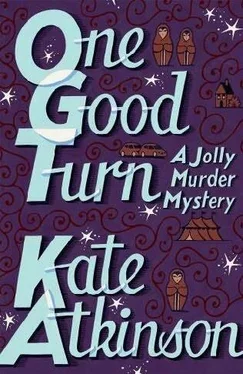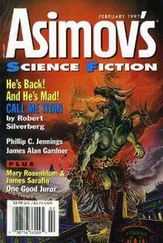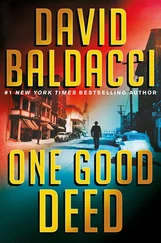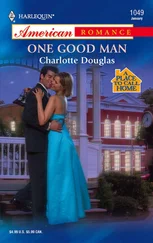The phone felt suddenly hot in her hand. “Is it done yet, is it over?” Maggie asked. “Have you got rid of Gloria? Have you got rid of the old bag?”
Gloria almost dropped the phone in surprise. Graham was planning to divorce her? Graham was having an affair with one of his sales team, and the pair of them were talking about getting rid of her? Gloria slipped the phone back in Graham’s pocket and left Maggie Louden speaking to his summer-weight wool. She could still hear her muffled voice-“Graham? Are you there, Graham?”- like a persistent clairvoyant at a séance. In the distance Gloria heard the soft explosion of the firework that signaled the end of the Tattoo. Had capitalism really saved mankind? It seemed unlikely, but it looked like it might be too late to argue with Graham about it now.
He had let her go. He had heard Marlee’s voice in his ear saying, “Daddy,” quietly as if she were treading water next to him, and he had relinquished his dead mermaid and kicked for shore. Helping hands had hooked him out of the harbor and taken him into the Cramond Inn, where a malt whiskey and a bowl of hot soup had brought him back to life. By the time the police arrived, he was wrapped in blankets and his clothes were being washed and dried in industrial machines somewhere in the recesses of the building.
Then he had begun the seemingly never-ending process of telling and retelling his story to a succession of people. “Have you been drinking, sir?” the first uniformed constable on the scene asked him, looking pointedly at the glass in his hand that had just been refilled. Jackson would have considered hitting him if he could have summoned up the energy. Another reluctant part of him acknowledged that the guy was just doing his job.
The final person to arrive (“This is actually my day off,” he heard her say to someone) was a detective, a woman, with more attitude than manners. She gave him her card, which had printed on it DETECTIVE SERGEANT LOUISE MONROE, the “Sergeant” crossed out in Biro and replaced with a handwritten “Inspector.” He thought that was quite funny. A newly minted inspector. He hoped she didn’t have anything to prove. She also asked if he had been drinking.
“Yes, I have been drinking,” he said, showing her the now half-empty glass. “So would you under the circumstances.”
“Don’t make assumptions,” she said sharply. She was pretty, sort of. Her mouth was a little too big for her face and her nose a little too small and she had a crooked front tooth, but she was still pretty. Sort of. Late thirties, dark hair, dark eyes, Jackson had never had much luck with blondes. Her hair was in a bob, neat and practical, and she tucked it behind her ears every so often in a gesture that Jackson always found appealing. In women, anyway. It was a remote and far-flung outpost of his brain that was making this appraisal. For the most part he was just trying to stop himself from falling asleep from exhaustion.
She liked asking questions. What was he doing on Cramond Is-land, had he realized the tide was coming in when he set out, how had he got here?
“Bus,” he said reluctantly. He felt as if he were owning up to being a lower life-form. He was naked beneath the blankets, and he felt absurdly vulnerable. A naked man who took buses and had nothing better to do with his time than lurk around suspiciously on deserted islands. With the tide coming in. How stupid was he? Very, obviously.
What was he doing in Edinburgh? He shrugged and said he was here for the Festival. She gave him a skeptical look that made him feel as if he were lying, he obviously didn’t look the Festival type. He thought about saying, “My girlfriend’s in a play, she’s an actress,” but really that was nobody’s business but his own, and “girl-friend” sounded stupid, girlfriends were what young guys had. Jackson tried to think what he would have been doing if he’d been in charge of the investigation, would he be as suspicious of his own credentials as Louise Monroe was or would he already have divers out on police launches, uniforms combing the coastline?
“Most people are upset when they find a dead body,” Louise Monroe remarked. “ ‘Shock’ and ‘horror’ are the usual reactions, yet you seem remarkably phlegmatic, Mr. Brodie. Have you seen a dead body before?” What did she think-that he’d mistaken a seal for a woman, a lump of driftwood for a body?
“Yes,” he said, weariness finally making him snap, “I’ve seen hundreds of dead bodies. I know exactly what a dead body looks like, I know what a body looks like when it’s been blown up, burned, hung, drowned, shot, stabbed, beaten to death, and hacked to pieces. I know what people look like when they’ve stood in front of a train going at a hundred miles an hour, when they’ve been decomposing inside a flat for the whole of a summer, and when they’re three months old and they’ve died in their sleep for no apparent reason. I know what a dead body looks like, okay?”
The butch DC accompanying Louise Monroe looked as if she were getting ready to handcuff him, but Louise Monroe nodded and said, “Okay,” and he liked her for that. “Police?” she said, and he said, “Ex. Military and civil-Cambridge.” Name, rank, and number, tell the enemy nothing else.
Somewhere back at Force Command, she told him, someone must have decided there was a chance the woman was still alive, and the coastguard had sent out an RNLI launch as well as alerted an RAF helicopter. “So you can stop fretting, Mr Brodie.” “Fretting” wasn’t exactly the word he would have used himself.
“It’s pointless,” he said, “she was dead.” Every time he said it, she seemed to slip farther away.
“Has anyone reported a girl missing?” he asked. There were always girls missing, always had been, always would be. There were no women or girls reported missing who fitted the description he had given, Louise Monroe said.
“Well, she probably hasn’t been reported yet,” Jackson said. “She hadn’t been in the water long. And sometimes it takes a while for people to realize that someone isn’t where they should be. And sometimes people are never missed. Not everyone has someone who’ll notice they’ve gone.” Who would miss him? Julia, Marlee, that was it. Without Julia there would be just Marlee.
“Have you got the egg with you? In your pocket, maybe?” she said.
Jackson frowned. “What do you mean?”
“I just wondered if you had it with you-the egg you’re going to teach me to suck.” She was a spiky little thing. Not that little, taller than Julia, but then everyone was taller than Julia.
Jackson wondered if she had someone at home who would notice if she was gone. No wedding ring, he saw, but that didn’t mean anything. His own wife (ex-wife) had never worn a ring, never even changed her name to his, yet, interestingly, on the back of her Christmas card last year there had been one of those little address labels that unequivocally declared MR. AND MRS. D. LASTINGHAM. Jackson had faithfully worn his wedding ring, he had taken it off only at the end of last year, throwing it into the Seine from the Pont Neuf on a weekend visit to Paris. He had meant it to be a dramatic gesture of some kind, but in the end he had let it fall quietly, a brief glint of gold in the winter sun, embarrassed at what people might think (sad middle-aged loser whose divorce has finally come through) .
“Could be suicide,” he speculated. (Yes, apparently he did have the egg with him, although she was no grandmother.) “Not many girls drown themselves, though, women aren’t noted for drowning. Maybe she simply fell into the water, perhaps while she was drunk. A lot of drunk girls around these days.”
Читать дальше












